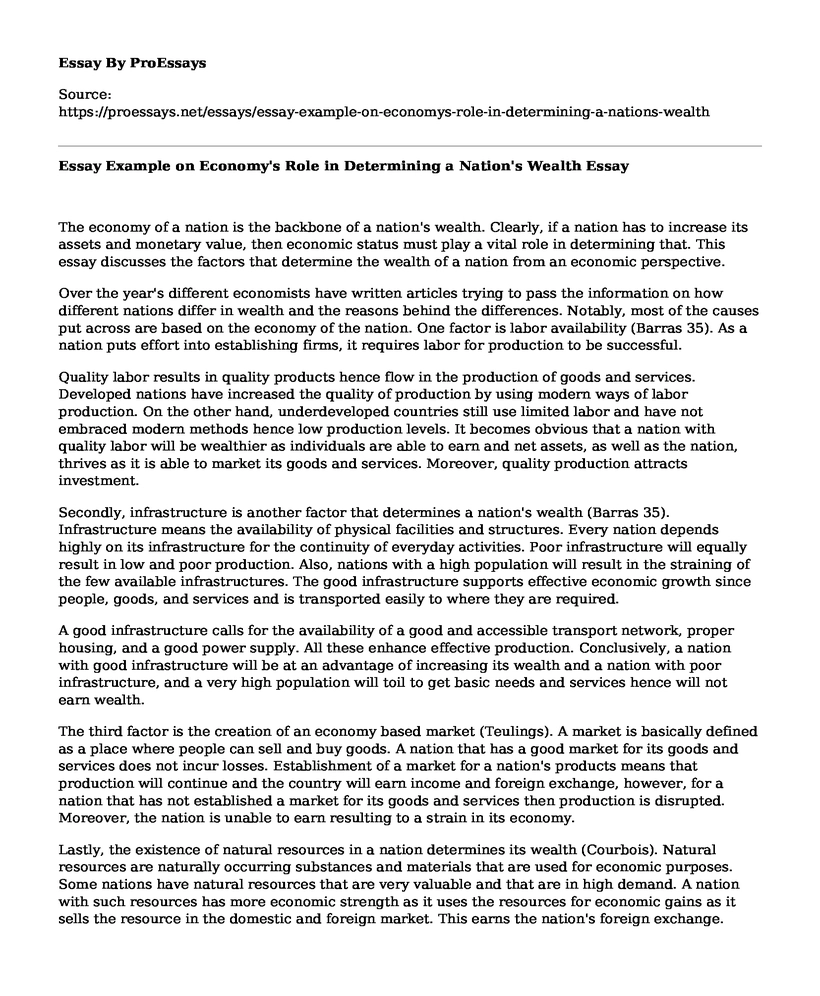The economy of a nation is the backbone of a nation's wealth. Clearly, if a nation has to increase its assets and monetary value, then economic status must play a vital role in determining that. This essay discusses the factors that determine the wealth of a nation from an economic perspective.
Over the year's different economists have written articles trying to pass the information on how different nations differ in wealth and the reasons behind the differences. Notably, most of the causes put across are based on the economy of the nation. One factor is labor availability (Barras 35). As a nation puts effort into establishing firms, it requires labor for production to be successful.
Quality labor results in quality products hence flow in the production of goods and services. Developed nations have increased the quality of production by using modern ways of labor production. On the other hand, underdeveloped countries still use limited labor and have not embraced modern methods hence low production levels. It becomes obvious that a nation with quality labor will be wealthier as individuals are able to earn and net assets, as well as the nation, thrives as it is able to market its goods and services. Moreover, quality production attracts investment.
Secondly, infrastructure is another factor that determines a nation's wealth (Barras 35). Infrastructure means the availability of physical facilities and structures. Every nation depends highly on its infrastructure for the continuity of everyday activities. Poor infrastructure will equally result in low and poor production. Also, nations with a high population will result in the straining of the few available infrastructures. The good infrastructure supports effective economic growth since people, goods, and services and is transported easily to where they are required.
A good infrastructure calls for the availability of a good and accessible transport network, proper housing, and a good power supply. All these enhance effective production. Conclusively, a nation with good infrastructure will be at an advantage of increasing its wealth and a nation with poor infrastructure, and a very high population will toil to get basic needs and services hence will not earn wealth.
The third factor is the creation of an economy based market (Teulings). A market is basically defined as a place where people can sell and buy goods. A nation that has a good market for its goods and services does not incur losses. Establishment of a market for a nation's products means that production will continue and the country will earn income and foreign exchange, however, for a nation that has not established a market for its goods and services then production is disrupted. Moreover, the nation is unable to earn resulting to a strain in its economy.
Lastly, the existence of natural resources in a nation determines its wealth (Courbois). Natural resources are naturally occurring substances and materials that are used for economic purposes. Some nations have natural resources that are very valuable and that are in high demand. A nation with such resources has more economic strength as it uses the resources for economic gains as it sells the resource in the domestic and foreign market. This earns the nation's foreign exchange. Nations with few or no natural resources are left to a disadvantage as they have nothing to offer to the domestic and foreign market, hence no economic gains.
Conclusion
A nation's wealth highly depends on the state of its economy. The economy of a nation depends on a variety of factors, which, when the well-utilized result in maximum achievement as discussed. Quality labor, good infrastructure, the existence of natural resources all result in quality production and flow of goods and services. A market creates a platform for the exchange hence capital increment.
References
Barras, Richard. "Wealth of the Nation." A Wealth of Buildings: Marking the Rhythm of English History. Palgrave Macmillan, London, 2016. 35-88.
Courbois, Jean-Pierre. Long Term Growth and the Wealth of a Nation: Growth Miracles and Lost Decades. No. 09-20. 2009.
Teulings, Coen. "What determines the enormous variation in the wealth of nations?."
Cite this page
Essay Example on Economy's Role in Determining a Nation's Wealth. (2023, Jul 21). Retrieved from https://proessays.net/essays/essay-example-on-economys-role-in-determining-a-nations-wealth
If you are the original author of this essay and no longer wish to have it published on the ProEssays website, please click below to request its removal:







